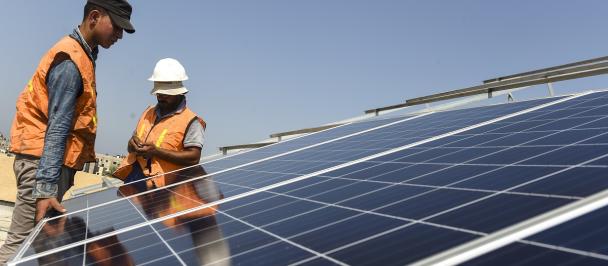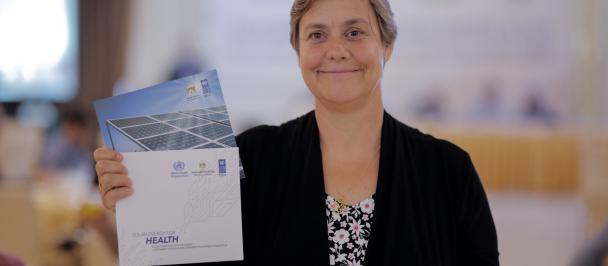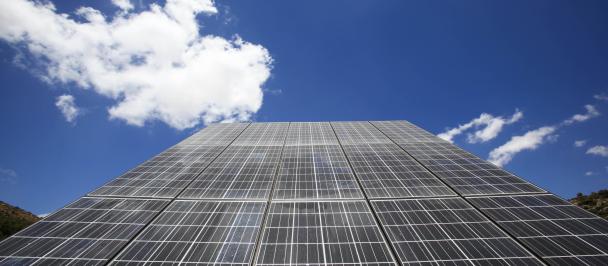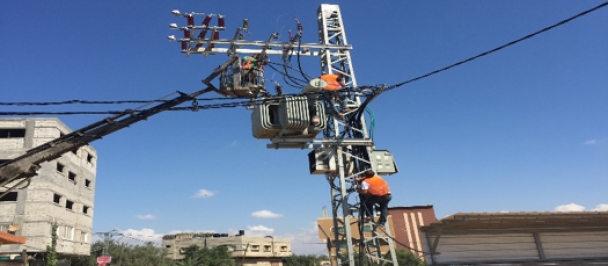Children seeking warmth around a fire at a home in Gaza. ©UNDP/PAPP - Shareef Sarhan
The energy sector, specifically electricity in the State of Palestine, is in a unique situation. This is essentially due to its vital role in driving sustainable development at economic and social levels, but it is also profoundly linked to political considerations, in which energy security is considered to be a critical issue for Palestinians across the State of Palestine.
Palestinians are heavily dependent on imported electricity from the Israeli networks: 87 percent of electricity consumed is secured from Israel and around 4 percent from Egypt and Jordan. The remaining 9 percent is produced locally in Gaza and used to fuel the region’s power plant on a continuous basis. Electricity debts to Israel’s Electric Corporation constitute a major challenge. In Gaza, the deficit in power supply imposes a huge constraint on its residents.
Despite outstanding national efforts to engineer reforms in the energy sector and developments on electricity transmission, distribution, and diversification of energy resources, the energy sector still faces major obstacles. The heavy dependency on electricity produced by Israel, limited access to alternative sources of electricity, and losses in electricity distribution networks have resulted in unaffordable rates. That is, electricity prices in the area are considered relatively high compared to regional counterparts. Prospects for implementing a new generation plant in the West Bank are subject to several factors and are vulnerable to political barriers and considerations.
To address the needs of the Palestinian people, the government started to explore and implement sustainable solutions, notably through investments in renewable energy, particularly in solar energy. Such efforts should be supported by all means. Investment in renewable energy is a crucial pathway to ensuring access to affordable, reliable, sustainable, and modern energy for all. Palestinian society offers an enabling environment for such efforts. Technological advancements coupled with the decline in solar energy costs and increased local expertise need to be capitalized on in order to further advance the use and security and sustainability of renewable energy sources. Testing new models of future investment is worth exploring – models that can contribute towards bridging the electricity gap and addressing the security issue while assisting the State of Palestine in meeting its global commitment towards reducing greenhouse gas emissions. We are witnessing great commitment and a strategic shift by the government that can be complemented with new business models for untapped sources of energy.
In previous years, UNDP has played a significant role in advocating for the deployment of renewable energy in Palestine through enormous investment envelopes, and it continues to do so. Several solar energy interventions were fully implemented at various public buildings, including hospitals, schools, and service facilities in Gaza, East Jerusalem, and the West Bank. Deployment of renewable energy has been mainstreamed by UNDP in the provision of infrastructure facilities, with noble targets for maximizing the benefit to local communities. In addition, energy efficiency and eco-sustainable infrastructure have been prioritized within UNDP development interventions. These efforts are fully in line with the Global Sustainable Development Agenda SDG’s 2030, specifically SGD 7 and UNDP strategic plan 2018–2021, mainly its signature solution: CLOSE THE ENERGY GAP.
Against this outline and the revamping of its advocacy, UNDP is suggesting a new pilot model for future testing, scaling up, and replication in order to transform energy challenges in the State of Palestine into promising opportunities. An overarching proposal has been proposed to encourage Local Governance Units (LGUs), especially in villages and towns, to invest in solar energy with medium-scale photovoltaic farms in order to contribute to reducing dependency on the Israeli electric grid. The income generated under this initiative is to be utilized as a revolving fund for advancing renewable energy interventions at the community level and also to extend these benefits to enhance service delivery, such as solid waste collection, community-based infrastructure, and other social-welfare initiatives. It is worth noting that, most of the time, these services are inadequate due to the fragility of the economic outlook on the LGUs, which are normally operative because of the continued support of international donors.
The suggested business model requires further consideration of the existing sector policy and legal frameworks that will provide a catalyst for private investment. Such a model would attract entrepreneurs through public-private partnerships to take charge of the management, maintenance, and operation of locally owned facilities. In addition, these entrepreneurs would be part of the implementation of future plans for revolving investments, while taking into account serious steps for reevaluating the current access opportunities for a green financing setup and institutional support to LGUs. Such a model is expected to foster local ownership at the community level and reinforce the utilization of natural resources at the same time as it protect the environment at large.
On another level, the electricity crisis in the Gaza Strip and the proposed solutions within the complicated geopolitical settings require looking into a more sustainable framework. Such a model would ultimately contribute towards matching the supply with the demand and tackling the electricity deficit, which seriously affects livelihoods in the Gaza Strip and sustainable development at large. This deficit has caused living conditions in Gaza to suffer, and consequently, it is becoming one of the most difficult places to live, at both the regional and international levels.
Solving the blackout in Gaza requires a costly solution, even if the political situation permits its implementation. Upgrading connection networks through a 161KV line with Israel stands as an issue that requires long-lasting negotiations. Converting the generation plant into a gas-based operation is also affected by political factors and will most likely not flourish in the near future, although it would indeed bring a cost-effective operation. Financing the fuel for Gaza Power Plant barely provides a suitable solution in terms of finding the source for covering the expenses and internal political debate, especially regarding the associated taxes on fuel.
The UN supports fuel provision for the operation of Gaza Power Plant, which partially meets the demand in Gaza, and which is currently at its maximum capacity of 60 MW. Fuel costs approximately US$ 10–15 million on a monthly basis, with a yearly investment of around US$ 150 million.
Within this bleak set of circumstances, advocacy for sustainable investment in solar energy offers a promising, cost-effective nexus to the electricity crises in the Gaza Strip. Tapping into a portion of the allocated financing for fuel and channeling such investments towards solar energy would bring sustainable results in the medium and long terms. An investment of US$ 50 million would produce equal electricity generated at Gaza Power Plant in self-reliable modes that do not require continuous fuel for operation, or gas, whose use continues to be debated. Such efforts require political will and advocacy at the national and international levels, especially as part of a dialogue that aims at maximum use of available un-accessed lands or the roofs of existing buildings. This solution would provide a model for scattered electricity generation.
UNDP will continue its efforts to keep the sustainable-energy agenda for the Palestinian people as its priority and will increase its advocacy and lobbying efforts to test new solutions even as it increases investment in solar energy through its various development interventions.
Motaz Dawabsheh, a programme analyst at UNDP/PAPP, has 15 years of experience in development. Motaz also has an MA in sustainable development and institution building.

 Locations
Locations


